- Home
- Marsha Altman
The Road to Pemberley
The Road to Pemberley Read online
Table of Contents
Title Page
Introduction
The Pemberley Ball
Part 1
Part 2
Part 3
Part 4
Part 5
But He Turned Out Very Wild
A Long, Strange Trip
An Ink-Stained Year
I. COLONEL FITZWILLIAM TO MR. DARCY
II. MISS BINGLEY TO MRS. HURST
III. COLONEL FITZWILLIAM TO MR. DARCY
IV. MISS BINGLEY TO MRS. BINGLEY
V. MISS BINGLEY TO MRS. HURST
VI. COLONEL FITZWILLIAM TO MR. DARCY
VII. MISS BINGLEY TO MRS. HURST
VIII. COLONEL FITZWILLIAM TO MR DARCY
IX. MISS BINGLEY TO MRS. HURST
X. COLONEL FITZWILLIAM TO MR. DARCY
XI. MISS BINGLEY TO JANE BINGLEY
XII. MISS BINGLEY TO MRS. HURST
XIII. COLONEL FITZWILLIAM TO MR. DARCY
XIV. MISS BINGLEY TO CHARLES BINGLEY
XV. MISS BINGLEY TO MRS. HURST
XVI. COLONEL FITZWILLIAM TO MR. DARCY
XVII. MISS BINGLEY TO MRS. HURST
XVIII. COLONEL FITZWILLIAM TO MR. DARCY
XIX. MISS BINGLEY TO MRS. HURST
XX. COLONEL FITZWILLIAM TO MR. DARCY
XXI. MISS BINGLEY TO MRS. HURST
XXII. COLONEL FITZWILLIAM TO MR. DARCY
XXIII. MISS BINGLEY TO CHARLES BINGLEY
XXIV. COLONEL FITZWILLIAM TO MR. DARCY
XXV. MISS BINGLEY TO MRS. HURST
XXVI. COLONEL FITZWILLIAM TO MR. DARCY
XXVII. MISS BINGLEY TO MRS. HURST
XXVIII. COLONEL FITZWILLIAM TO MR. DARCY
XXIX. MISS BINGLEY TO MRS. HURST
XXX. COLONEL FITZWILLIAM TO MR. DARCY
XXXI. MISS BINGLEY TO MRS. HURST
XXXII. COLONEL FITZWILLIAM TO MR. DARCY
XXXIII. MISS BINGLEY TO MRS. HURST
XXXIV. COLONEL FITZWILLIAM TO LORD BUXTON
XXXV. COLONEL FITZWILLIAM TO MR. DARCY
XXXVI. MISS BINGLEY TO MRS. HURST
XXXVII. COLONEL FITZWILLIAM TO MR. DARCY
XXXVIII. MISS BINGLEY TO MRS. HURST
XXXIX. COLONEL FITZWILLIAM TO MR. DARCY
XL. COLONEL FITZWILLIAM TO MR. DARCY
XLI. MISS BINGLEY TO MRS. HURST
XLII. COLONEL FITZWILLIAM TO MR. DARCY
XLIII. MISS BINGLEY TO LORD BUXTON
XLIV. COLONEL FITZWILLIAM TO MISS BINGLEY
XLV. MISS BINGLEY TO COLONEL FITZWILLIAM
XLVI. COLONEL FITZWILLIAM TO MISS BINGLEY
XLVII. MRS. FITZWILLIAM TO MRS. DARCY
The Potential of Kitty Bennet
A Good Vintage Whine
Georgiana’s Voice
Secrets in the Shade
Chapter 1—Intimation
Chapter 2—Intrusion
Chapter 3—Wickham’s Letter
Chapter 4—The Meeting
Chapter 5—Revelation
Chapter 6—Entrapment
Chapter 7—Illumination
Chapter 8—Confrontation
A View from the Valet
Part 1
Part 2
Beneath the Greenwood Trees
Chapter 1
Chapter 2
Chapter 3
Chapter 4
Chapter 5
Father of the Bride
Chapter 1
Chapter 2
Chapter 3
Chapter 4
Chapter 5
Pride and Prejudice Abridged
Other Ulysses Press Books
Acknowledgments
Copyright Page
Introduction
Congratulations! If you have purchased this book, you are now a member of an active culture, if you were not in fact one already: the culture of Jane Austen’s writing. Recently, it has been particularly prolific, leading to the creation of this anthology to highlight some of the best short fiction drawn from literally thousands of stories written in the style of Jane Austen over the past twenty years, most of them in the last five.
This is not by any means a new social phenomenon. The first known spin-off of Jane Austen’s work was published in 1913. Sybil G. Brinton’s Old Friends and New Fancies sought to continue the adventures of characters from all six of Jane Austen’s published novels in one book. Its commercial success is unknown, as very few editions of Brinton’s book existed until it was reprinted in 1998, well after it had, like Austen’s own work, fallen into the public domain.
The second spin-off was the vastly superior Pemberley Shades by Dorothy Bonavia-Hunt, which focused exclusively on the characters from Pride and Prejudice. This too went out of print except for a brief publication in the 1970s, and was revived again in 2007 by Laughing Man Publications, a press I created for the express purpose of republishing Pemberley Shades. The book’s unavailability had made it the stuff of legends. After the text was digitalized, other publishers have done their own reprintings to return the novel to the public conversation.
The first wave of the real revival of Austen-inspired fiction began in 1995, when the BBC miniseries of Pride and Prejudice aired. This time, aspiring authors had a friend called the Internet, and this friend could connect them to thousands and then millions of people who might be interested in reading their work for the cost of the modem and a small monthly fee. This was also when the technology for digital printing improved enough to make print-ondemand books possible; this took the publisher out of the equation and made self-publishing available to people other than the very rich. Such self-published Jane Austen novels made their appearance on the market in 1997 and 1998, while short-form fiction found its way onto organized online forums like The Republic of Pemberley and The Derbyshire Writer’s Guild. This surge lasted a few years, then the enthusiasm retreated to the most loyal and dedicated fans.
When the second wave arrived with the big-screen adaptation of Pride and Prejudice, publishers were better prepared, and a good deal of previously self-published Jane Austen books were scooped up by traditional presses and republished. The Internet now spawned countless websites (a slight exaggeration—you actually can count the number of Austen sites in existence) and opportunities for writers.
Which is where I come in (because I am clearly the most important person here, not Jane Austen). When I saw the Pride and Prejudice movie in 2005, I was not unfamiliar with the story, having read the book in 1999 and seen the miniseries a few years after that. But while I simply liked previous incarnations, I was at a time in my life when, for some reason, Austen’s words—or more accurately, Elizabeth and Darcy’s—spoke to me as they have to countless (this time it is not an exaggeration) readers and viewers since the novel was first published in 1813. The presence of other Austen-inspired fiction by amateur—and some not very amateur—writers encouraged me to dip my pen into this type of historical fiction wholly unreserved (as the original draft of my first novel on Fanfiction.net makes obvious). Three years and ten manuscripts later, I had a book deal, a pile of Pride and Prejudice books on my shelf, and more English history tomes than is feasible for someone with an apartment in Manhattan.
I have never shied away from using the term “fan fiction” (or “fanfic”) to describe what it is we are reading here. It is a precise technical term: fiction written by fans of an original work. Since entering the publishing world, never have I seen so many euphemisms for the obvious: sequels, spin-offs, inspirations, retellings, reinventings, and “paraliterature.”
The last I encountered in a rather brusque manner. After my first book deal and my graduation from City College of New York with a Master of Fine Arts in Creative Writing, I made the traditional Austen pilgr
image to England, visiting the house where she did most of her writing in Chawton, her grave in Winchester, and the estate that probably served as the inspiration for Pemberley (and was in fact used for exterior shots in the 2005 movie), Chatsworth House. Most of the places I visited sought to cash in on the craze with every bit of paraphernalia possible, which is why I own a key chain with Jane Austen’s image on one side and the opening line to Pride and Prejudice on the other, and a feathered pen that came in a package with an oil picture that is labeled as Mr. Darcy (but is obviously the likeness of Colin Firth).
At one of these locations, I pointed out the presence of some books on the shelf of the gift shop. “Oh, you’ve got fanfic! I love this stuff. You know, my own book—”
“It’s not fan fiction!” the person working the register said, waving a finger in my direction. “It’s paraliterature. We only sell books that are retellings from Darcy’s point of view. The sequel stuff is junk!”
The technicalities of how this line was drawn eluded me, as one of the novels on the shelf featured a piece of paraliterature in which Darcy, Lord Byron, and several servants engaged in a well-written omnisexual orgy, but the implication was that that was somehow better than my little post-novel story and Jane Austen would be more approving of its existence. I decided not to mention this, as the mood was already confrontational and I still had things to buy in the shop.
Anyway, here’s some fan fiction. Enjoy!
Marsha Altman
New York, New York, 2011
The Pemberley Ball
BY REGINA JEFFERS
Regina Jeffers is the author of several Jane Austen adaptations including Darcy’s Passions, Darcy’s Temptation, Vampire Darcy’s Desire, The Phantom of Pemberley and Captain Wentworth’s Persuasion. She considers herself a Janeite and spends her free time with the Jane Austen Society of North America and AustenAuthors.com. A teacher for nearly forty years in the public school systems of three different states, Jeffers is a Time Warner Star Teacher Award winner, a Martha Holden Jennings Scholar, a Columbus Educator Award winner, and a guest panelist for the Smithsonian. She’s served on various national educational committees and is often sought as a media literacy consultant. Her first Regency romance, The Scandal of Lady Eleanor, was released in March 2011 by Ulysses Press.
In writing “The Pemberley Ball,” Jeffers decided to stay with the originally proposed theme of this anthology, Elizabeth and Darcy’s first year of marriage and the challenges they might face individually and together.
Part 1
Yes.
She had said yes. She would be his. Forever. After a year of piercing heartache, Elizabeth Bennet had accepted his proposal, and where winter had once held sway in Darcy’s heart, springtime now filled it. Although he had been loath to admit it, Elizabeth had fascinated him from the beginning—fascinated him more than anyone else ever had.
Yet Darcy had at first scarcely allowed her to be pretty; he had looked at her without admiration at the Meryton assembly; and when they next met, he looked at her only to criticize. But no sooner had he made it clear to himself and his friends that Elizabeth had hardly a good feature than he realized that her dark eyes were uncommonly intelligent. “Eyes that could haunt a man’s sleep,” he told himself as he checked his cravat in the mirror.
“I beg your pardon, sir,” his valet said and looked up from brushing Darcy’s jacket.
Darcy smiled. “It is nothing, Mr. Jordan—just thinking aloud.” In the mirror, Darcy watched the man—who had served him for fifteen years—roll his eyes. Darcy understood perfectly. Less than a week earlier, he had been an outsider—an observer of life, never a participant. He had fought valiantly to maintain his distance, keeping his friends and acquaintances to a minimum. Years ago, he had learned his lesson the hard way. Darcy’s most trusted friend had betrayed him on every level. Even now, as his fists closed tightly at his side, he could taste the bitterness. Yet despite the fact that his brain had warned him to be wary, he had chosen to place his trust in another—Elizabeth Bennet.
Her acceptance had given him the hope that things could be different. Elizabeth brought warmth and naturalness and a bit of defiance; but there was vulnerability also. She had bravely withstood Caroline Bingley’s barbs while devotedly nursing her sister. She had verbally fenced with the paragon of haughtiness that was his aunt, Lady Catherine, and had come away unscathed. Despite Darcy’s best efforts to resist Elizabeth, she made him laugh.
“Your coat, sir.” Mr. Jordan held the jacket as Darcy slipped his arms through and allowed the valet to straighten the seams across his shoulders.
“Thank you, Mr. Jordan.” Darcy tugged easily on his cuffs to set the line. “I will be at Longbourn for the supper hour.” It was his first meal with the Bennets as Elizabeth’s betrothed, and he pronounced his evening’s entertainment more so to solidify the event’s reality in his mind than to keep his valet informed.
Again, the amused twitch of Jordan’s lips told Darcy that his man understood how Darcy’s life had changed. “Very good, sir.”
He realized that his servants had waited for him to choose a bride—to bring a mistress to Pemberley. Now he was to marry Elizabeth and take her to his ancestral home. In the fullness of time, they would set up a nursery. He knew now that only Elizabeth—with her loving nature, her common sense, and her goodness—could be the mother of his children. “Turn down the bed, and lay out my things, and then you may be excused for the evening. Upon my return, I will undress myself.” Darcy accepted a handkerchief from Mr. Jordan.
“As you wish, Mr. Darcy.”
Darcy’s heart swelled with happiness as he sat beside Elizabeth at the Longbourn table. The most recent time he had dined with the Bennets, her mother had placed him as far away from Elizabeth as the table would allow. He had spent the meal on one side of Mrs. Bennet. Such a situation had given pleasure to neither of them, and he certainly had not appeared to advantage. Whenever he and Elizabeth’s mother had spoken to each other, Darcy could not abandon his formal tone. Tonight, ungraciousness would not describe him.
“The venison is excellent, Mrs. Bennet,” he announced. The way the Bennets talked over one another made him wish for a quiet meal at Pemberley. He relished such meals, which he currently shared with his sister, and he looked forward to sharing them with Elizabeth. Picturing Elizabeth at his table was a recurring daydream.
Elizabeth gave him the smallest of smiles, and his heart jumped. There had been a time when he prayed for such moments, and now they were his to cherish.
Mrs. Bennet preened with his praise and then returned her attention to her eldest daughter and Mr. Bingley. This pleased Darcy; that left him to converse with Mr. Bennet and Elizabeth, the true intellects at the table. Unwilling to lose his favorite daughter, Mr. Bennet had originally not welcomed Darcy’s courtship of Elizabeth, but Mr. Bennet had subsequently accepted Elizabeth’s assurance of her regard for Darcy.
“Elizabeth tells me that you are considering investing in railroads, Mr. Darcy.”
Mr. Bennet sipped his wine, but Darcy observed the man’s eyebrows rise mockingly. “It appears prudent to become a partner while the companies are forming. I am considering a small company catering to Derbyshire’s needs, taking products to Liverpool for shipment to the Americas and north toward Manchester and the factories. The cities draw workers from the estates. It would be a way to save my father’s legacy.”
Surprisingly, Mr. Bennet’s expression changed to one of respect. “Well, Lizzy. It appears that your young man has a head for business.”
Elizabeth looked lovingly at her father, tears pricking the corners of her eyes. “Yes, Papa.” Then she smiled. “It is a happy situation. Mr. Darcy shall not bore me with inane chatter at the breakfast table. He has, I fear, quite a good mind,” she said playfully. And although she spoke kindly of him, Darcy flinched. Being teased, even kindly, still hurt him as if were twelve years old once again.
Back at Netherfield, Darcy had always enjoyed eng
aging Elizabeth in what he fondly called verbal swordplay, but somehow this felt different, and his tone came out sharper than he intended. “I pride myself on being well read.” Darcy had responded automatically, and he waited for the “attack,” but it did not come. Instead, Elizabeth looked questioningly at him. Darcy gave his head a little shake, telling her not to ask. Then he turned to her father, “Mr. Bennet, what might you tell me of Miss Elizabeth’s childhood? I will need plenty of stories for our friends if I am to brighten the long winters of Derbyshire.”
Throughout the rest of the meal, Mr. Bennet—with occasional comments from his wife or one of Elizabeth’s sisters—regaled Darcy with tales of a young Elizabeth’s exploits. Everything that he had ever considered that he knew of her changed somehow. He discovered the source of Elizabeth’s self-deprecation lay in Mrs. Bennet’s continual praise of her eldest and her youngest. He now understood why Mary Bennet sought refuge in her music, and the immature Kitty in her interest in fashion. Each girl claimed her own niche, and Elizabeth’s strengths rested in less stereotypically feminine accomplishments. She possessed a pleasing voice, but Elizabeth did not play the pianoforte exceptionally well, nor was her needlework beyond being adequate. She was not gifted in languages nor did she paint tables, cover screens, or net purses.
Elizabeth owned a quick wit, and she used it as her defense against being found wanting. “Follies and nonsense, whims and inconsistencies, do divert me, and I laugh at them whenever I can,” she had said one evening at Netherfield, when Caroline Bingley had insisted on Elizabeth’s walking about the room with her. Now, despite thoroughly enjoying the flush of pink coloring her skin, Darcy considered how many of Elizabeth’s earlier escapades might appear quite mortifying to her in their retellings. It seemed that many of her embarrassing moments had come at her own hand. She often acted impulsively. Although he understood why she used her daring as a diversion, he could not help but wonder if Elizabeth would not be happier if known for her merits, rather than her mistakes. But negative attention is still attention, he told himself.

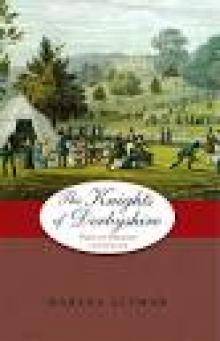 The Knights of Derbyshire
The Knights of Derbyshire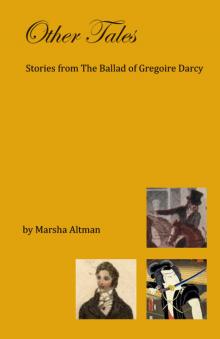 Other Tales: Stories from The Ballad of Gregoire Darcy
Other Tales: Stories from The Ballad of Gregoire Darcy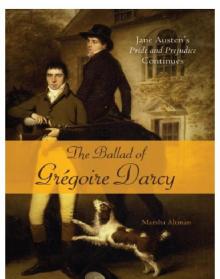 The Ballad of Gregoire Darcy
The Ballad of Gregoire Darcy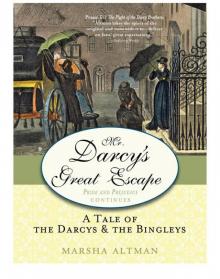 Mr. Darcy's Great Escape
Mr. Darcy's Great Escape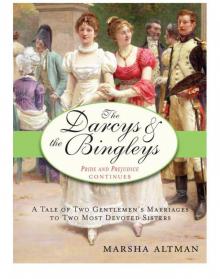 The Darcys and the Bingleys
The Darcys and the Bingleys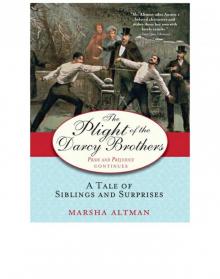 The Plight of the Darcy Brothers
The Plight of the Darcy Brothers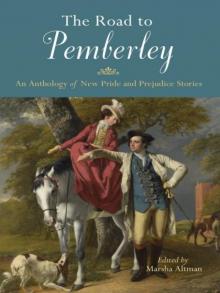 The Road to Pemberley
The Road to Pemberley